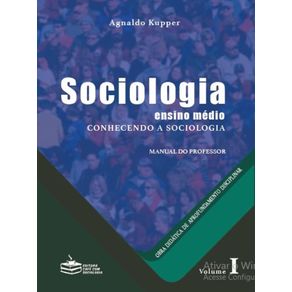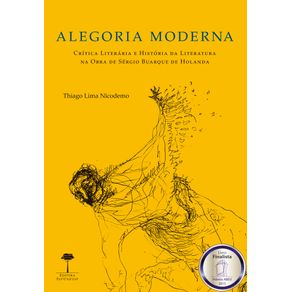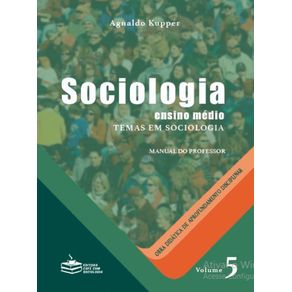| Selo | Springer Nature |
|---|---|
| Edição | 0 |
| Idioma | Inglês |
| Autores | Graciela Tonon |
| Acabamento | Capa Comum |
| Quantidade de Páginas | 70 |
| Origem | Literatura Estrangeira |
 Ensaios de A a Z para mentes inquietas
Ensaios de A a Z para mentes inquietas
Ferreira Branco, Clécio
R$ 69,90 à vista A justiça mais injusta
A justiça mais injusta
Telha
R$ 52,00 à vista TDICs e Sociologia: propostas pedago?gicas: (volume 2)
TDICs e Sociologia: propostas pedago?gicas: (volume 2)
Editora Café com Sociologia
R$ 47,90 à vista TDICs e Sociologia: propostas pedago?gicas (volume 1)
TDICs e Sociologia: propostas pedago?gicas (volume 1)
Editora Café com Sociologia
R$ 45,90 à vista Sociologia: ensino médio - Conhecendo a Sociologia (Vol.1)
Sociologia: ensino médio - Conhecendo a Sociologia (Vol.1)
Editora Café com Sociologia
R$ 70,90 à vista Sociologia: ensino médio - Poder e Política (Vol.4)
Sociologia: ensino médio - Poder e Política (Vol.4)
Editora Café com Sociologia
R$ 70,90 à vista Alegoria moderna
Alegoria moderna
Editora Unifesp
R$ 59,00 à vista Entre proteção e punição
Entre proteção e punição
Editora Unifesp
R$ 42,00 à vista Mefistófeles e o andrógino
Mefistófeles e o andrógino
WMF Martins Fontes - POD
R$ 64,90 à vista Ética econômica das religiões mundiais vol. 2
Ética econômica das religiões mundiais vol. 2
Editora Vozes
R$ 150,00 ou até 3x sem juros Somos racistas? - A dissimulação discursiva do racismo no Brasil
Somos racistas? - A dissimulação discursiva do racismo no Brasil
EDUFSCAR
R$ 60,90 à vista Afonsinho e Edmundo – A Rebeldia no Futebol Brasileiro
Afonsinho e Edmundo – A Rebeldia no Futebol Brasileiro
Musa
R$ 40,00 à vista Um dia você vai sentir na própria carne: afeto, memória, gênero e sexualidade
Um dia você vai sentir na própria carne: afeto, memória, gênero e sexualidade
Paco Editorial
R$ 44,90 à vista Corpo, gênero, sexualidade e futebol - O que pensam os estudantes sobre a prática do futebol por mulheres
Corpo, gênero, sexualidade e futebol - O que pensam os estudantes sobre a prática do futebol por mulheres
Dialética
R$ 73,40 à vista Metacognição E Leitura
Metacognição E Leitura
Clube de Autores
R$ 48,90 à vista Sociologia: ensino médio - Temas de Sociologia (Vol.5)
Sociologia: ensino médio - Temas de Sociologia (Vol.5)
Editora Café com Sociologia
R$ 69,90 à vista A era da empatia
A era da empatia
Companhia das Letras
R$ 89,90 à vista Sociologia: ensino médio - Poder e Política (Vol.4)
Sociologia: ensino médio - Poder e Política (Vol.4)
Editora Café com Sociologia
R$ 70,90 à vista Alegoria moderna
Alegoria moderna
Editora Unifesp
R$ 59,00 à vista O que avaliar quer dizer?
O que avaliar quer dizer?
Editora Unifesp
R$ 75,00 à vista O conflito
O conflito
Rosa dos Tempos
R$ 79,90 à vista Afonsinho e Edmundo – A Rebeldia no Futebol Brasileiro
Afonsinho e Edmundo – A Rebeldia no Futebol Brasileiro
Musa
R$ 40,00 à vista Outras formas de entender a democracia: as teorias da participação e da deliberação
Outras formas de entender a democracia: as teorias da participação e da deliberação
Paco Editorial
R$ 51,90 à vista Mulher deve votar?: o código eleitoral de 1932 e a conquista do sufrágio feminino através das páginas dos jornais Corre
Mulher deve votar?: o código eleitoral de 1932 e a conquista do sufrágio feminino através das páginas dos jornais Corre
Paco Editorial
R$ 71,90 à vista O novo (e precário) mundo do trabalho: Reestruturação produtiva e crise do sindicalismo
O novo (e precário) mundo do trabalho: Reestruturação produtiva e crise do sindicalismo
Projeto Editorial Praxis
R$ 153,90 ou até 3x sem juros Pró - Reivindicando os direitos ao aborto
Pró - Reivindicando os direitos ao aborto
AUTONOMIA LITERARIA
R$ 70,90 à vista Mobilidade antirrascista
Mobilidade antirrascista
AUTONOMIA LITERARIA
R$ 92,90 à vista Masculinidades - Sombra e luz
Masculinidades - Sombra e luz
Dialética
R$ 83,90 à vista Corpo, gênero, sexualidade e futebol - O que pensam os estudantes sobre a prática do futebol por mulheres
Corpo, gênero, sexualidade e futebol - O que pensam os estudantes sobre a prática do futebol por mulheres
Dialética
R$ 73,40 à vista Metacognição E Leitura
Metacognição E Leitura
Clube de Autores
R$ 48,90 à vista Ensaios de A a Z para mentes inquietas
Ensaios de A a Z para mentes inquietas
Ferreira Branco, Clécio
R$ 69,90 à vista Sociologia: ensino médio - Temas de Sociologia (Vol.5)
Sociologia: ensino médio - Temas de Sociologia (Vol.5)
Editora Café com Sociologia
R$ 69,90 à vista TDICs e Sociologia: propostas pedago?gicas (volume 1)
TDICs e Sociologia: propostas pedago?gicas (volume 1)
Editora Café com Sociologia
R$ 45,90 à vista Sociologia: ensino médio - Conhecendo a Sociologia (Vol.1)
Sociologia: ensino médio - Conhecendo a Sociologia (Vol.1)
Editora Café com Sociologia
R$ 70,90 à vista Alegoria moderna
Alegoria moderna
Editora Unifesp
R$ 59,00 à vista Somos racistas? - A dissimulação discursiva do racismo no Brasil
Somos racistas? - A dissimulação discursiva do racismo no Brasil
EDUFSCAR
R$ 60,90 à vista Mulher deve votar?: o código eleitoral de 1932 e a conquista do sufrágio feminino através das páginas dos jornais Corre
Mulher deve votar?: o código eleitoral de 1932 e a conquista do sufrágio feminino através das páginas dos jornais Corre
Paco Editorial
R$ 71,90 à vista Ideologia do branqueamento nas telenovelas brasileiras
Ideologia do branqueamento nas telenovelas brasileiras
Paco Editorial
R$ 62,90 à vista Representações de ciência e tecnologia no modernismo conservador brasileiro
Representações de ciência e tecnologia no modernismo conservador brasileiro
Paco Editorial
R$ 47,90 à vista Pró - Reivindicando os direitos ao aborto
Pró - Reivindicando os direitos ao aborto
AUTONOMIA LITERARIA
R$ 70,90 à vista Corpo, gênero, sexualidade e futebol - O que pensam os estudantes sobre a prática do futebol por mulheres
Corpo, gênero, sexualidade e futebol - O que pensam os estudantes sobre a prática do futebol por mulheres
Dialética
R$ 73,40 à vista Schottisch à Brasileira - Dos salões às gravações – um percurso transatlântico entre 1850 e 1900
Schottisch à Brasileira - Dos salões às gravações – um percurso transatlântico entre 1850 e 1900
Dialética
R$ 99,65 à vista Metacognição E Leitura
Metacognição E Leitura
Clube de Autores
R$ 48,90 à vista O Surgimento Da Sofística E Sua Contribuição À Educação Política Na Antiga Grécia
O Surgimento Da Sofística E Sua Contribuição À Educação Política Na Antiga Grécia
Clube de Autores
R$ 53,90 à vista Por Que Amamos Sem Amor?
Por Que Amamos Sem Amor?
Clube de Autores
R$ 56,61 à vista